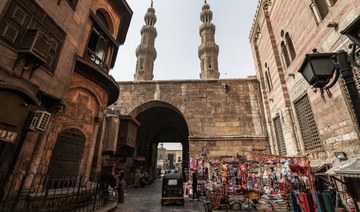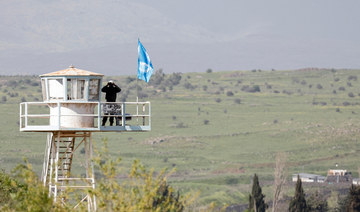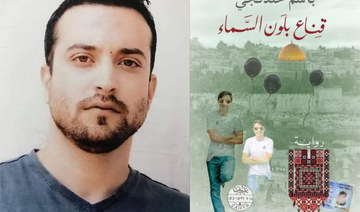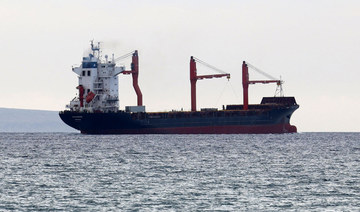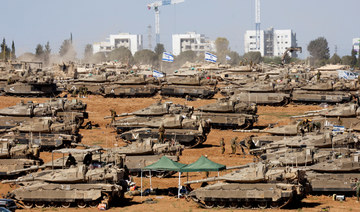DUBAI: Public opinion surveys conducted in Saudi Arabia and the UAE are revealing a mix of sharp changes in attitudes and an uptick in optimism that the coronavirus crisis will be resolved in the next three months.
Nearly two months ago, as coronavirus was declared a global pandemic by the World Health Organization (WHO), the online research firm YouGov began tracking attitudes and behaviors surrounding the coronavirus disease (COVID-19), using their global research panel of more than 8 million respondents.
When YouGov published its first findings on March 18, 64 percent of Saudi residents said they were scared of catching the virus; the corresponding figure for the UAE was 61 percent.
On May 6, YouGov released the eighth wave of its tracker data, which suggests that the threat perception has only increased: 75 percent of Saudi respondents reported being fearful of contracting the infection while 73 percent of UAE residents felt the same way.
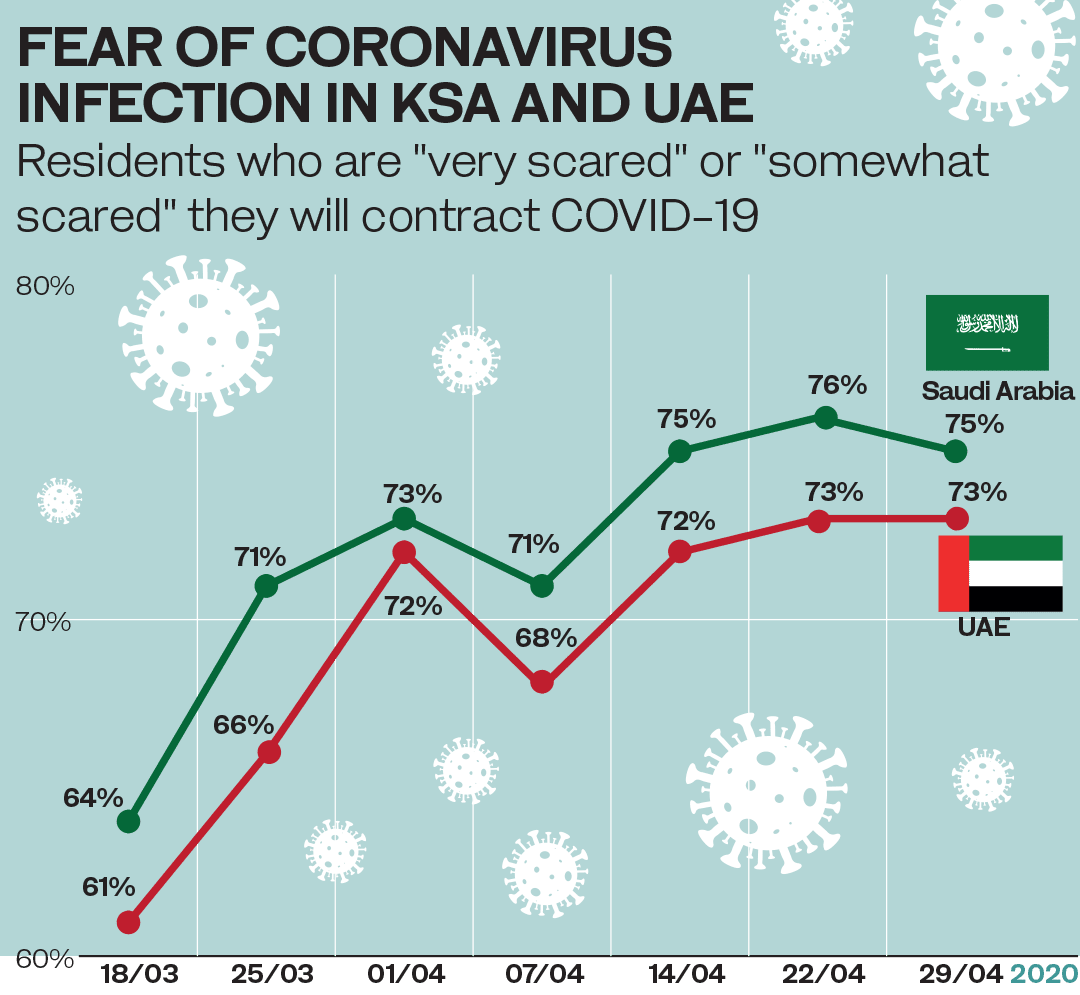
Just 7 percent described themselves as “Not at all scared that I will contract COVID-19,” while 12 out of the 2,002 people surveyed reported having already contracted the virus.
Globally, over 4 million people have been infected by COVID-19 and more than 276,000 of them have died.
In Saudi Arabia, the number of confirmed cases now exceeds 35,000 while the UAE has reported 16,793 confirmed cases.
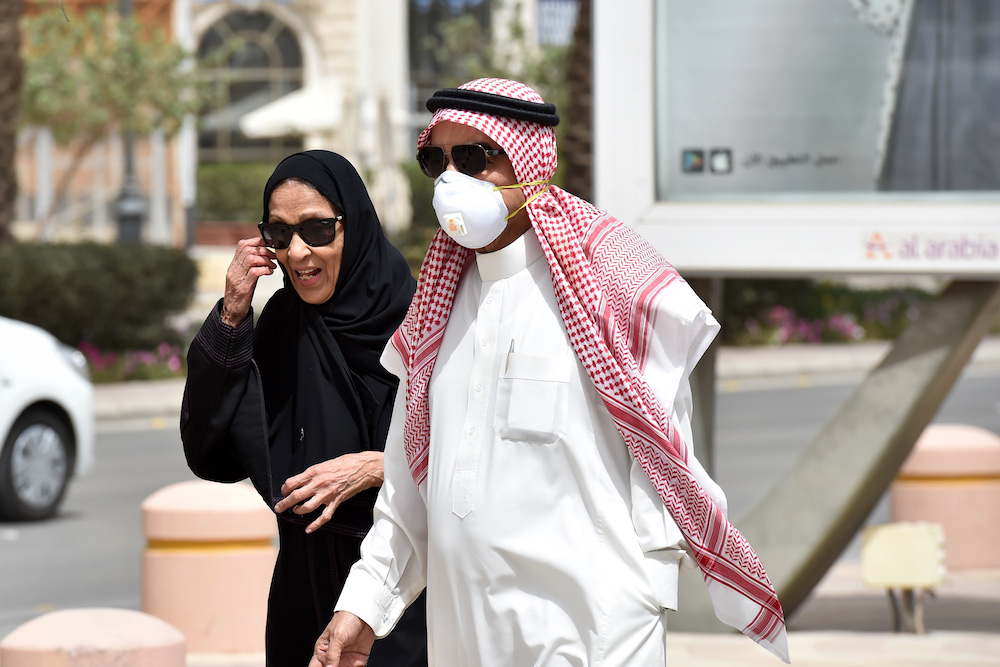
A Saudi man, wearing a protective mask as a precaution against COVID-19 coronavirus disease, walks with his wife along Tahlia street in the centre of the capital Riyadh. (AFP/File Photo)
With widespread and persistent fear of the illness continuing to dominate daily life, it is unsurprising that 46 percent of Saudi and UAE residents strongly feel that the pandemic will permanently change the way we live and interact with each other.
Just 8 percent of respondents do not agree with the statement “The coronavirus pandemic will permanently change the way we live and interact with each other.”
Both the UAE and Saudi Arabia have managed to keep COVID-19 fatality cases to less than 1 percent of the total number of infections — among the lowest ratios in the world, going by available data.
According to self-reported figures, just 0.66 percent of those contracting the virus in Saudi Arabia die from the disease where as In the UAE, the figure is 0.93 percent.
These figures are lower than the WHO’s latest estimated mortality rate of 3.4 percent (by comparison, seasonal flu globally kills far fewer than 1 percent of those infected).
The low mortality rates of Saudi Arabia and the UAE can perhaps be explained by their high testing rates, young populations and effective social distancing measures.
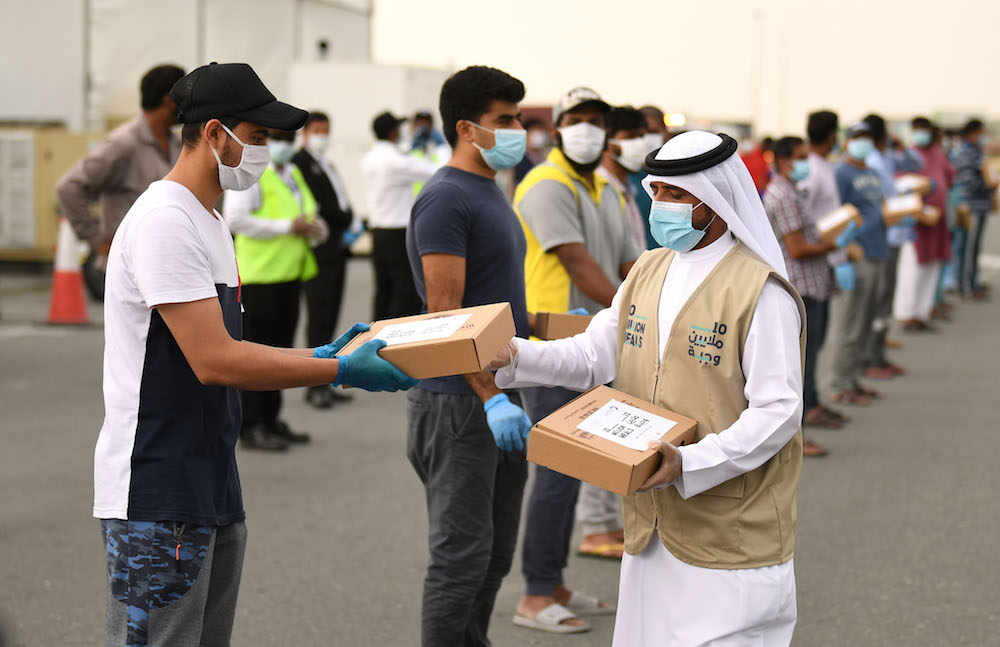
Volunteers distribute Iftar meals to migrant workers keeping distance from each other during the Muslim holy month of Ramadan within the initiative of Sheikh Mohammed bin Rashid al-Maktoum, the ruler of Dubai, to distribute 10 million meals. (AFP/File Photo)
YouGov data suggests that the practice of social distancing has been widely adopted in both countries.
Indeed, 98 percent of Saudi and UAE respondents said they have changed their daily behaviors and are now taking precautionary measures.
These include avoiding crowded places (78 percent), wearing a face mask (71 percent), improved personal hygiene (74 percent) and working from home (47 percent).
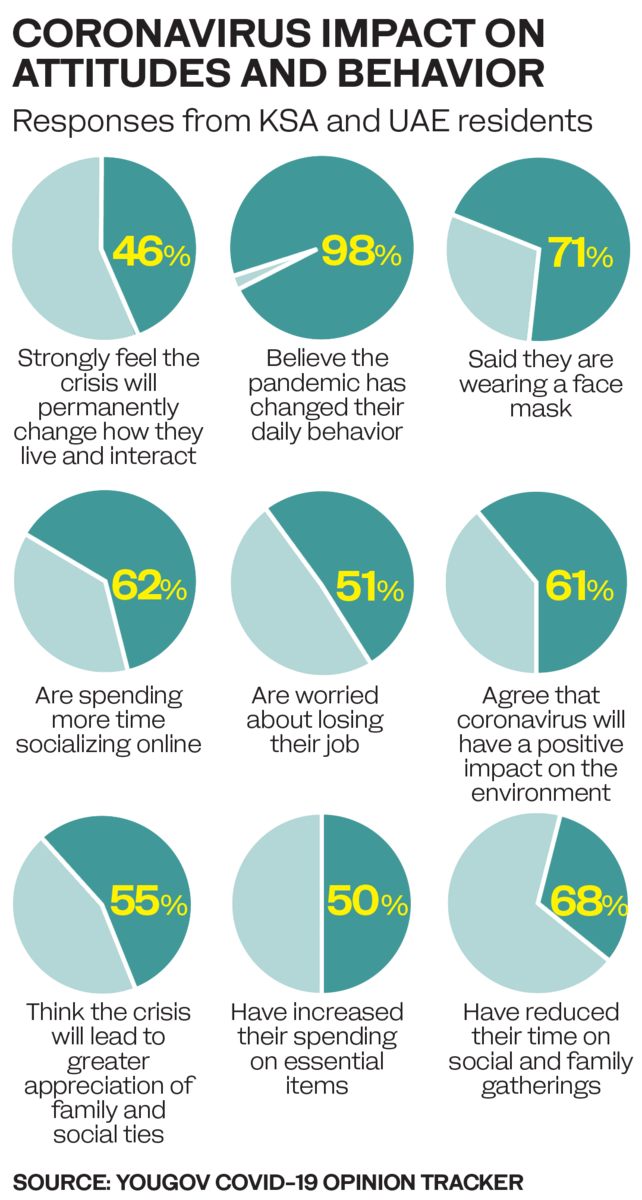
In the UAE, where wearing a face mask is now mandatory in public, 80 percent of respondents said they are complying with this measure.
The corresponding figure for Saudi Arabia is lower, at 63 percent.
By contrast, the percentage of people who said they are working from home in Saudi Arabia is higher (54 percent) than in the UAE (44 percent).
And as the Gulf countries enter the second week of the holy month of Ramadan, the YouGov data indicates that the coronavirus is not only changing residents’ daily habits, but also having an impact on some of their oldest traditions.
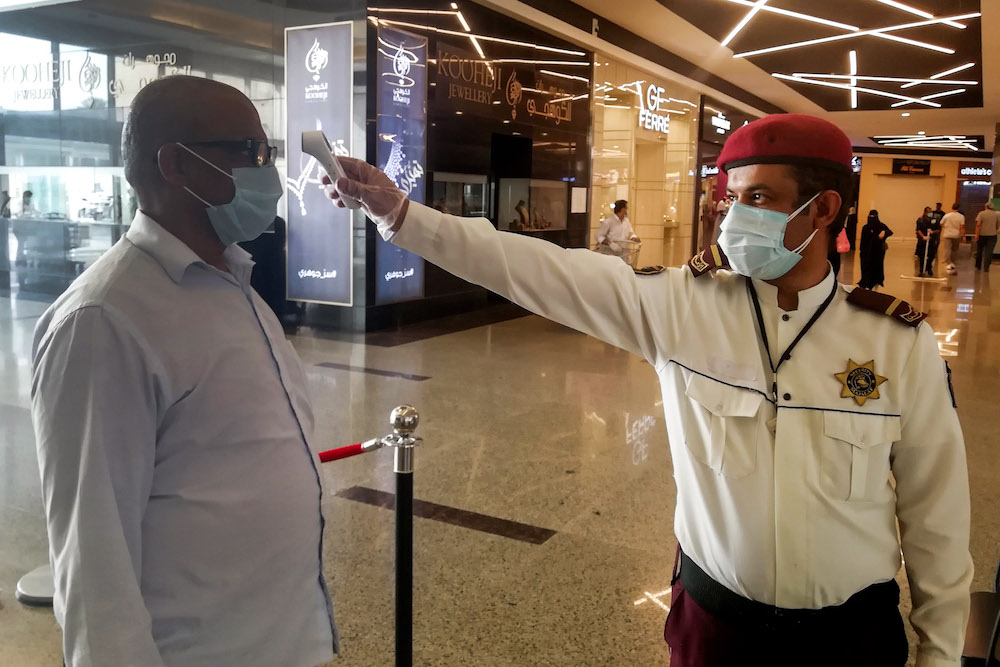
A security guard checks temperature of man arriving at a shopping mall, as a screening precaution against the COVID-19 coronavirus pandemic, in the Saudi capital Riyadh on May 4, 2020, as malls reopen after authorities began a partial lifting of the coronavirus lockdown. (AFP)
With more residents observing Ramadan at home, 50 percent of UAE and Saudi respondents reported spending more money on essential items such as groceries, 45 percent of residents said they are watching more TV than in previous years, and 49 percent said they are watching more online content.
With 68 percent reporting fewer in-person gatherings, many residents are looking online to maintain connections with friends and families.
The YouGov data suggests 62 percent of Saudi and UAE residents have increased the amount of time they are spending socializing online through messaging or video calling and 66 percent are spending more time social media browsing.
Data released by YouGov in early April suggests that an increasing number of people (51 percent) in Saudi Arabia and the UAE are concerned about losing their jobs.
Notably, UAE residents are much more worried about this outcome compared with those of Saudi Arabia (64 percent vs 38 percent).

People wearing masks for protection against the coronavirus, walk in the Mall of Dubai on April 28, 2020, after the shopping centre was reopened as part of moves in the Gulf emirate to ease lockdown restrictions. (AFP/File Photo)
Mindful of a challenging time ahead, 58 percent of Saudi respondents said they have decreased their spending on non-essential items since last year.
The proportion of UAE residents who expressed the same sentiment was higher, 61 percent.
At the same time, Gulf Arabs' streak of generosity remains strong as ever, with 39 percent of respondents saying that they have increased their charitable donations since last year.
In the two countries, 35 percent said their charitable giving is the same as last year, with just 20 percent saying this amount has decreased since last year.
The virus impact is being felt positively in other areas as well.
Going by the YouGov tracker data, a majority of residents in Saudi Arabia and the UAE feel that the coronavirus crisis will have a positive impact on life as they know it.
Only 10 per cent (most likely 18-24-year-olds) said they feel that nothing positive will emerge from the experience.
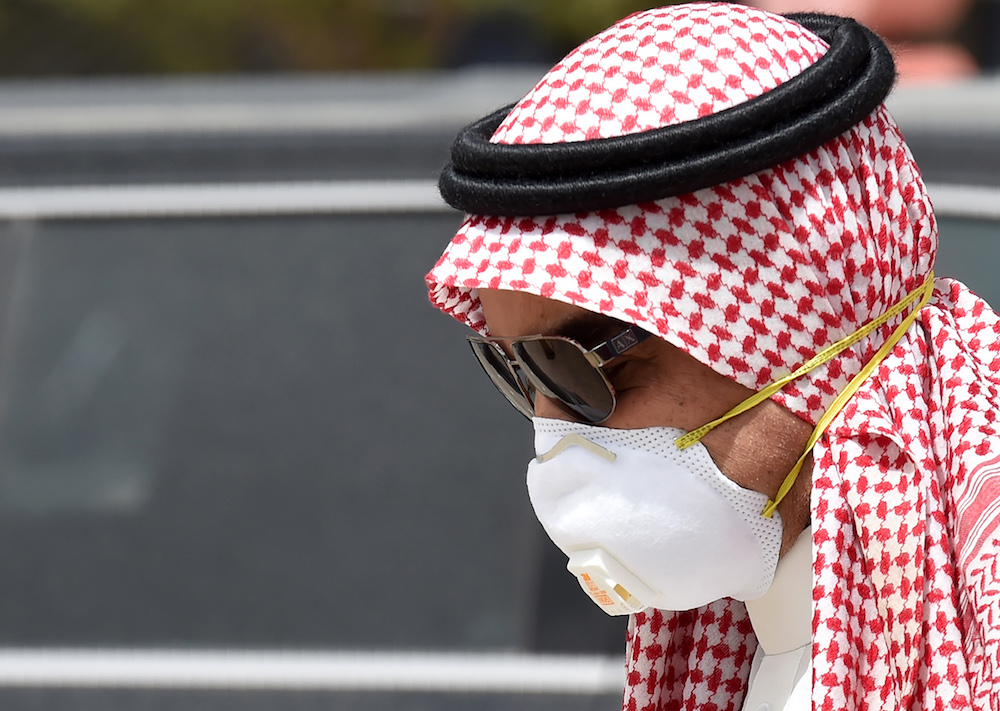
A Saudi man, wearing a protective mask as a precaution against COVID-19 coronavirus disease, walks along Tahlia street in the centre of the capital Riyadh on March 15, 2020. (AFP/File Photo)
The vast majority of respondents (61 percent) agree that coronavirus pandemic will have a positive impact on the environment; 55 percent feel that it will lead to greater appreciation of family and social ties; and 34 percent believe it has the potential to drive transformation in technology.
The data suggests, however, that the two countries’ residents are divided on when and how the coronavirus crises is likely to be resolved.
In terms of numbers, 37 percent were optimistic that a global resolution would happen by the end of June; 53 percent said by the end of August; and 66 percent by the end of the year.
Whilst the majority are optimistic, 13 percent expect the crisis to continue into 2021 and a further 21 percent do not know or cannot say when the crises might end.
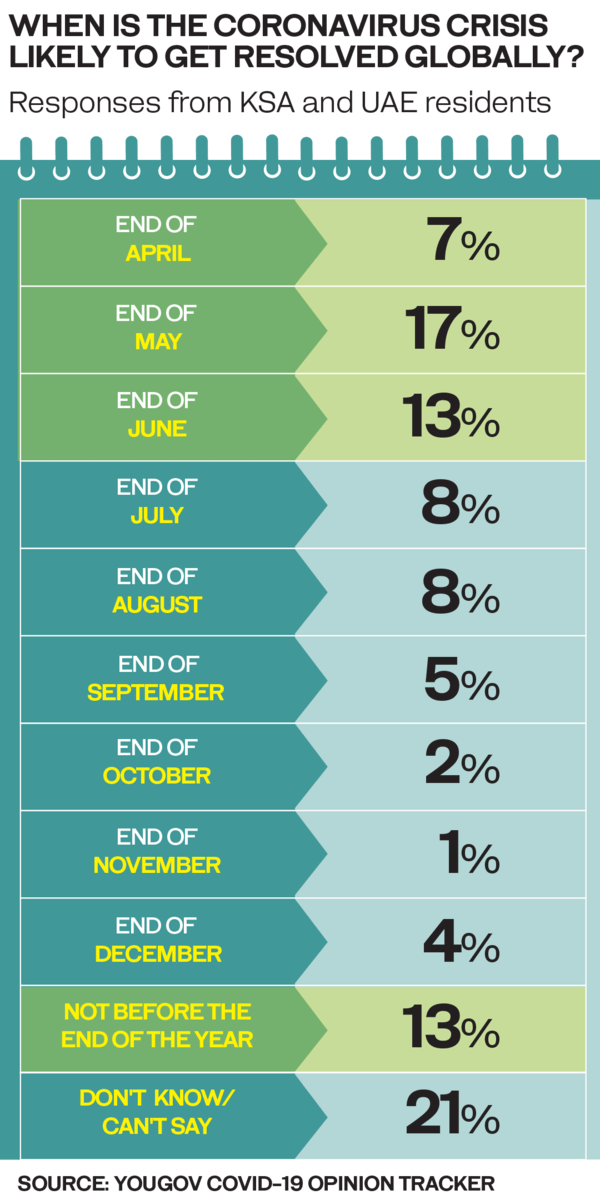
Many in the Kingdom and the UAE think waiting for a vaccine to materialize before resumption of normal activities might not be possible.
Just 9 percent said that they would need a vaccine to be ready before they feel comfortable visiting shopping malls.
One in five people feel that an effective coronavirus treatment is the key to getting life back to normal.
Overall, a mere 20 percent of Saudi and UAE respondents said they would feel comfortable visiting restaurants, cinemas, shopping malls and hotels even if a medicine to treat coronavirus was made widely available.




